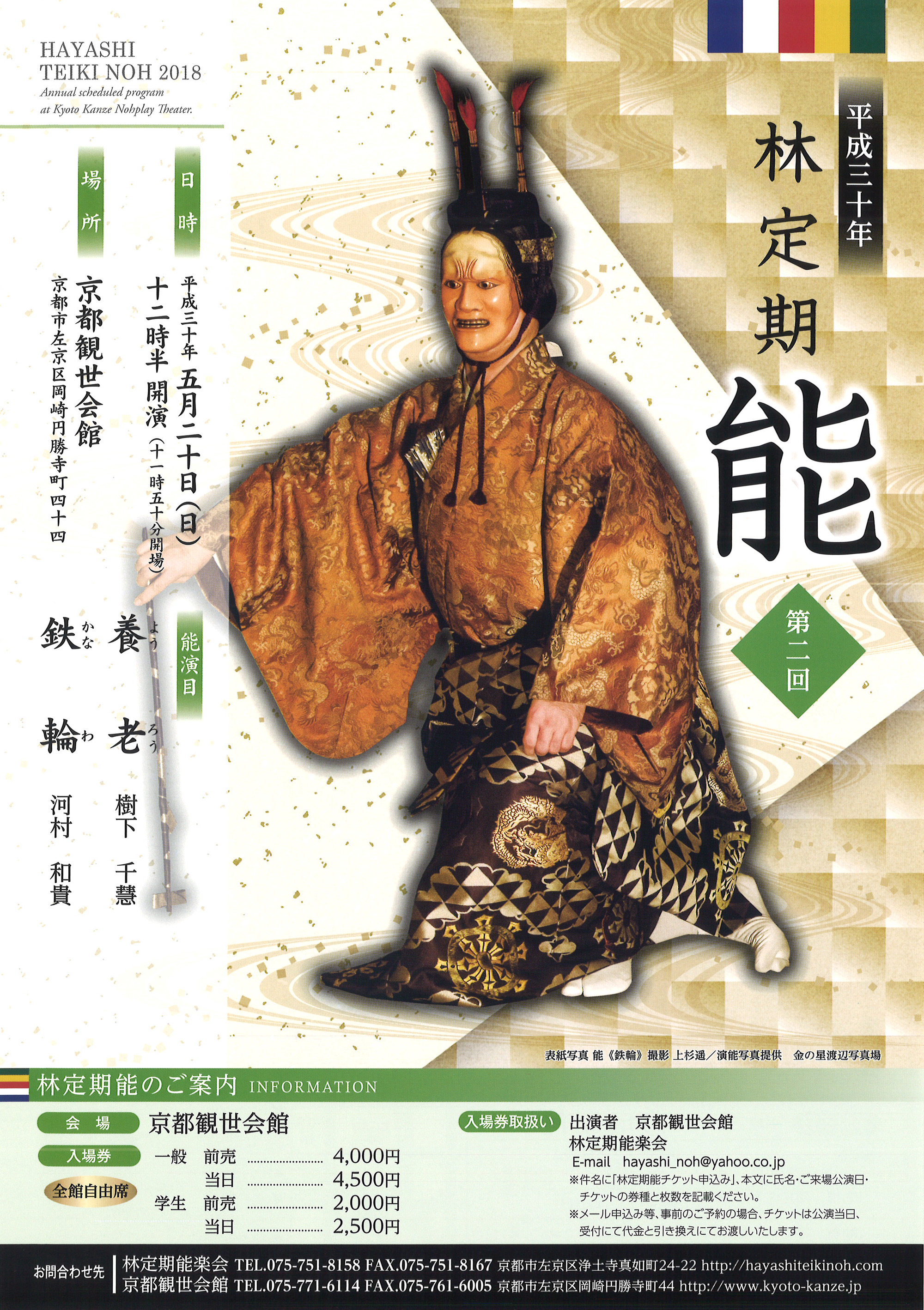林定期能 第二回 Hayashi Teiki Noh
2018年 5月 20日 (日) 12:30開演(開場11:50)
- 演目
-
能「養老」
Noh"Yoro"
シテ:樹下千慧
ツレ:河村紀仁
Shite: Chisato Jyuge
Tsure:Norihito Kawamura
狂言「萩大名」 Kyogen"Hagidaimyo"シテ:茂山逸平
Shite:Ippei Shigeyama
能「鉄輪」 Noh"Kanawa"シテ:河村和貴
Shite: Kazutaka Kawamura
- 料金
- 一般前売:¥4,000 一般当日:¥4,500 学生前売:¥2,000 学生当日:¥2,500 Advance ¥4,000 At the Door ¥4,500 Students Advance ¥2,000 Students At the Door ¥2,500
・全席自由席となります。
・終了予定時間は17:00です。
・林宗一郎は能「養老」地謡、仕舞「九世戸」、能「鉄輪」後見にての出演となります。 ・All seats are general admission.
・The performance is scheduled to end at 5:00p.m.
・Soichiro Hayashi will perform as "Jiutai" in Noh"Yourou",as"Shimai"in"Kusenoto" and as "Koken" in Noh "Kanawa".
能「養老」
鎌倉時代の説話集「十訓抄(じっきんしょう)」などに掲載されている養老の滝伝説を基にした世阿弥作の脇能もの。
美濃国で霊泉が湧き出たと聞いた雄略天皇が勅使を派遣する。
勅使は当地に下り、霊泉に「養老」と名付けた親子(シテ・ツレ)に会う。
そのいわれをたずねると、その水を飲むと身も心も癒え、老いた父を養い喜ばせたとの事、親孝行の報いとしてこの滝の霊水を授けられたといって勅使を泉へと案内する。
さらに老人は長寿と水にまつわる故事を引き、その水を讃える。
すると、滝の周囲に楽の音が聞こえ、花が空より降りただならぬ様子となる。
やがて山神(後シテ)が現れ、泰平の御世を讃え、神舞を舞い天上へと帰って行く。
薬の水(霊水)とは酒の事であり、そのめでたさと霊泉への信仰を中心においたおめでたい演目である。
「鉄輪(かなわ)」
日本に古くから伝わる呪術、丑の刻参り。丑の刻とは午前1時から午前3時頃の時間帯を指し、憎い相手を藁人形に見立てて、7日間かけて呪い殺すというものである。
自分を捨てて他の女を妻とした夫を恨み、鬼になりたいと丑の刻参りをする女(前シテ)にある日、神のお告げがくだる。
赤い着物を着て、顔に丹を塗り、頭に乗せた鉄輪に三本蝋燭を灯し、怒る心を持つならば鬼神になるというものだった。
「玉椿の八千代、二葉の松乃、末かけて変らじとこそ思いしに。などしも捨ては果て給うらん。あら恨めしや」女は執心の鬼(後シテ)となり男の元へと向かう。
一方の夫(ワキツレ)の方は、最近夢見が悪く、安倍晴明(ワキ)の元に相談に行く。
すると晴明は、女の怨みが深く、男の命は今宵限りと占う。
清明は三重の高棚に供物を整えると三十番神を呼び出すのだった。
Noh "Yourou"
This is a Waki Noh-Mono* written by Zeami based on the legend of Yourou Waterfalls listed in Jikkinshou, a collection of stories from the Kamakura Period (the end of the 12th century to the mid 14th century).
The Emperor Yuryaku, who heard that a miraculous fountain has sprung up in Mino Province, sends an imperial messenger.
The messenger descends to the place and meets an old man and his son (Shite・Tsure) who named the miraculous fountain "Yourou."
The messenger asks the reason for it and they say the old man was healed both physically and mentally after drinking the water from the fountain and that made him pleased.
The son also tells the messenger he was bestowed this wonder-working fountain because he took good care of his father and he guides the messenger to the fountain. Furthermore, the old man cites the proverb related to longevity and water and praises the water.
Then, a sound of music starts around the waterfall and the flowers start falling down from the sky and the extraordinary atmosphere surrounds the area.
Before long, Yamagami, a god of a mountain, (Ato Shite) appears and praises the peace reign of the emperor and goes back to heaven dancing along with Shinto music.
The healing water means sake, and this is a celebrational performance featuring the joy and the devotion to the miraculous fountain.
.* Waki Noh-Mono
When Noh-plays are categorized depending on the plot, this is the one featuring God and celebrates the peace that reigns in the country.
By categorizing depending on the plot, it is about the role of Shite.
There are also “Man, Woman, Maniac, Demon” and these are collectively called “Gobandate”.
Noh"Kanawa"
An ancient curse in Japan, Ushi no Koku Maori. "Ushi no koku" indicates the time period from 1am to 3am, and a person uses a straw doll to resemble someone he or she hates and curses them to death over 7days.
An oracle from a god is sent to a woman (Mae Shite), in the service of Ushi no Koku Mairi, wanting to be a demon and holding a grudge against her husband who abandoned her and married another woman. The oracle said she can become a demon god if she wears a red kimono, paints her face red, wears an iron ring on her head with three lit candles upright, and holds a raging heart.
"You said, like forever-lasting flowers of camellia, we won't be parted like two buds of pine and this feeling won't change, but then why did you abandon me? Oh, curses upon you." The woman turns into a devoted demon (Ato Shite) and heads for her husband.
Meanwhile, the husband (Waki Tsure) has recently been having a bad dream and goes to *Abe No Seimei (Waki) for advice.
The Seimei foresees that the man's life will only last for tonight since the woman's grudge is deep. Seimei sets the offerings on the high shelf separated into three levels and summons Sanjubanshin (the thirty gods who protect the country or the lotus sutra taking turns each day of the month).
*Abe no Seimei
An onmyoji who actually existed in Japan (Kyoto) in the 10th century. Onmyoji is someone who practices fortune-telling and rituals. Seimei was also an astrologist and his power was acknowledged widely, then he became the founder of the Abe clan who unified the Bureau of Onmyo which was in charge of the compilation of fortune-telling, astronomy, time and calendar until the 19th century. After his death, Seimei Shrine, which worships Abe no Seimei, was built on the site of his house by the order of Emperor Ichijo. (Now exisiting, Ichijo Horikawa).





